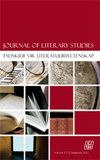《与世界对话的祖鲁国王:查卡语的翻译和跨文化策略》(1981),作者托马斯·莫福罗
IF 0.1
4区 文学
0 LITERARY THEORY & CRITICISM
引用次数: 1
摘要
本文将Thomas Mofolo的《Chaka》(1981)作为跨文化作者的跨文化文本进行讨论。它的起源是混合的,写作时考虑到当地和全球的观众,并在不同的种族、国家、语言和文学传统之间建立了联系。通过这种方式,它打破了与“欧洲”和“非洲”文学之间明显区别相关的中心边缘极性。在将注意力转移到跨文化的纠缠上时,我注意到丽贝卡·瓦尔科维茨(Rebecca Walkowitz)在她的书《出生的翻译》(2015)中概述的观点,即一些文学作品以多种语言和地理位置开始合作和比较,并针对不同文化和语言的读者。瓦尔科维茨考察了这些文学过程在当代英语文学中的重要性,但我认为莫福罗的小说以自己的方式“生来就是翻译的”,并展示了瓦尔科维茨在讨论j·m·库切、小春树和牙买加·金凯德等作家时所强调的许多特征。本文概述了翻译如何塑造了莫福罗的小说,并成为其创作的条件,它以不同的语言和不同的市场以不同的版本存在,这一事实如何影响了它的文学和政治意义,以及莫福罗的小说可以被理解为“天生的翻译”写作的多种方式。本文章由计算机程序翻译,如有差异,请以英文原文为准。
A Zulu king in conversation with the world: Translational and transcultural strategies in Chaka (1981) by Thomas Mofolo
This article discusses Chaka (1981) by Thomas Mofolo as a transcultural text written by a transcultural author. It had hybrid origins, was written with local and global audiences in mind and forges linkages between different ethnicities, nations, languages and literary traditions. In this way it disrupts the centre periphery polarity associated with stark distinctions between “European” and “African” literatures. In shifting the attention to the transcultural entanglements without which Chaka would never have been written or read, I am being mindful of the view of Rebecca Walkowitz, outlined in her book Born Translated (2015), that some literary works begin collaboratively and comparatively, in multiple languages and geographical locations, and are targeted to readerships in various cultures and languages. Walkowitz examines the importance of these literary processes in contemporary Anglophone literature, but I will argue that Mofolo’s novel was in its own way “born translated” and displays many of the characteristics highlighted by Walkowitz in her discussions of writers like J. M. Coetzee, Haruki Marukami and Jamaica Kincaid. The article outlines how translation shaped Mofolo’s novel and became a condition of its production, how its literary and political meanings are influenced by the fact that it exists in different editions in different languages and in different markets, and the multiple ways in which Mofolo’s novel can be understood as “born translated” writing.
求助全文
通过发布文献求助,成功后即可免费获取论文全文。
去求助
来源期刊

Journal of Literary Studies
Multiple-
CiteScore
0.50
自引率
0.00%
发文量
0
期刊介绍:
The Journal of Literary Studies publishes and globally disseminates original and cutting-edge research informed by Literary and Cultural Theory. The Journal is an independent quarterly publication owned and published by the South African Literary Society in partnership with Unisa Press and Taylor & Francis. It is housed and produced in the division Theory of Literature at the University of South Africa and is accredited and subsidised by the South African Department of Higher Education and Training. The aim of the journal is to publish articles and full-length review essays informed by Literary Theory in the General Literary Theory subject area and mostly covering Formalism, New Criticism, Semiotics, Structuralism, Marxism, Poststructuralism, Psychoanalysis, Gender studies, New Historicism, Ecocriticism, Animal Studies, Reception Theory, Comparative Literature, Narrative Theory, Drama Theory, Poetry Theory, and Biography and Autobiography.
 求助内容:
求助内容: 应助结果提醒方式:
应助结果提醒方式:


